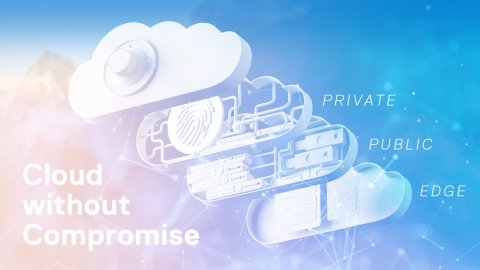Dell Technologies and Google Cloud launch Dell Technologies Cloud OneFS for Google Cloud to help organisations control exponential data and application growth and ease the flow of files across their private clouds and Google Cloud.
Dell also seeks to reduce the barrier of entry and improving overall capabilities for hybrid cloud deployments with additional Dell Technologies Cloud advancements. Customers now can move workloads across public and private clouds with greater flexibility and adopt a hybrid cloud approach that best fits their needs while reducing costs. According to Forrester, customers using Dell Technologies Cloud over the course of three years could see an incremental return on investment of more than 170% and recoup their costs in fewer than six months.
“Data and workloads exist everywhere – at the edge, in core data centers and public clouds. And, while data and apps are multiplying, IT resources and budgets are not. For companies to turn their data into competitive differentiators, they need a way to manage it seamlessly and consistently, no matter where it resides,” said Deepak Patil, senior vice president and general manager, Cloud Platforms & Solutions, Dell Technologies. “Dell Technologies Cloud brings the best of the public cloud to the data center and the best of the data center to the public cloud, removing complexity so companies can spend less time managing their infrastructure and more time delivering value to their customers.”
OneFS for Google Cloud delivers a native cloud experience that combines the scalability and performance of scale-out network-attached storage from the industry’s number one provider of storage systems, Dell Technologies, with Google Cloud’s analytics and compute services. Now, companies can easily move and access high performance computing and demanding workloads, as large as 50 petabytes, in a single filesystem between on-premises Dell EMC Isilon filesystems and Google Cloud without having to make changes or adjustments to their applications.
According to a recent report from Enterprise Strategy Group (ESG), while file data often accounts for at least half of an organisation’s on-premises data, very little of it is stored in public clouds, primarily due to performance and scale limitations. Take the media and entertainment industry, for example. Video files with 4K resolution demand terabytes of storage and require high throughput and low latency file storage, which makes it challenging for production companies to manage large file workloads in public clouds. But, now with OneFS for Google Cloud, they can easily work across private and public clouds with consistent operations and have the flexibility to scale as needed.
“We’re proud to partner with Dell Technologies to deliver high-performance, scalable cloud storage services to our customers with OneFS for Google Cloud,” said Rich Sanzi, vice president of Engineering at Google Cloud. “Through this partnership, customers can more quickly and effectively leverage Dell Technologies storage solutions through Google Cloud and have access to the best of breed file storage solutions, across hybrid cloud environments.”
Dell Technologies Cloud, which tightly integrates infrastructure and services across the Dell Technologies portfolio, makes hybrid clouds simpler to deploy and manage regardless of where data and applications reside. With new Dell Technologies Cloud advancements, organisations can more easily create a modern applications experience in every cloud, close the cloud-native skills gap and get the most out of their entire infrastructure.
Dell Technologies Cloud Platform now provides a simple and direct path to Kubernetes from a single environment, with support for containerised workloads and traditional virtual machines on the same Dell EMC VxRail infrastructure. This approach integrates VMware Cloud Foundation 4.0 and Dell EMC VxRail into a single solution, enabling a consistent approach across all cloud locations. VMware administrators can use familiar tools to manage modern apps that combine both containers and virtual machines from a single operating environment.
With the Dell Technologies Cloud Platform subscription model and deployment services, available through Dell Technologies On Demand, customers now have more choices for consuming cloud infrastructure and can get up and running in as little as two weeks. With new node configuration options that include as few as four nodes, customers can begin their hybrid cloud journey at approximately half the cost and smaller footprint and grow their cloud deployment over time.
Dell Technologies Cloud Platform offers customers a self-managed solution. For customers seeking a cloud service, Dell Technologies today also announced the next-generation of VMware Cloud on Dell EMC featuring an enterprise scale, 42 rack unit infrastructure, doubling the amount of supported processor cores, memory options and NVMe all-flash storage. The cloud service is now also certified with VMware Horizon to support business continuity efforts through the delivery of virtual desktops and applications to remote workforces as well as to healthcare workers in hospitals and clinics. VMware Cloud on Dell EMC, which offers data center as-a-service capabilities, provides customers with more simple, secure and scalable infrastructure at their on-premises data center and edge locations.
Dell Technologies Cloud is extending its – capabilities to networking with new updates to Dell EMC SD-WAN Solution powered by VMware. Customers now have more appliance and bandwidth capability options for rapid deployment of SD-WAN in a single solution. This helps improve performance for demanding workloads, like VOIP, video streaming and VDI, and ensure application performance and business continuity.





